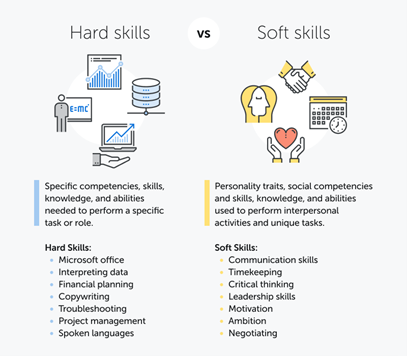When you’re looking for a new job, you know that your skills and experience are what’s going to get you in the door. But what’s it like once you’re there? Do they care about your hard skills and experience anymore? Or is soft skill training the way to go?
Let’s talk about them individually so that you know the difference between soft skills and hard skills in more details.
What are hard skills?
When it comes to finding a job, your hard skills are what will set you apart from the competition. Hard skills are defined as specific, measurable abilities and knowledge that enable a worker to perform a certain task. They are usually learned through formal education or training programs.
Here are some hard skills examples:
- Accounting
- Coding languages
- Graphic design
- Project management
- Sales strategies
The above-mentioned hard skills examples are a non-exhaustive list and there could be many such examples which we have not included in this list.
While soft skills are important for any job seeker, employers often place more emphasis on hard skills when making hiring decisions. That’s because hard skills can be objectively measured, whereas soft skills are more difficult to quantify.
That’s not to say that soft skills aren’t important — they play a vital role in determining whether an employee is a good fit for a particular position. But when all else is equal, an employer will often choose the candidate with the stronger hard skillset.
What are soft skills?
In the job industry, soft skills are highly sought after by employers. Soft skills are personal attributes that enable someone to interact effectively and harmoniously with other people.
Some examples of soft skills include:
- Strong communication ability
- Active listening skills
- The ability to resolve conflict
- Emotional intelligence
- A positive attitude
These days, employers are valuing soft skills more and more as they realize that these skills are essential for building a strong workplace culture and maintaining productivity levels.
One of the advantages of having soft skills is that employers realize that it is harder for them to train an employee on a soft skill like patience than any hard skill like the workings of a new accounting software.
If you’re looking for a job, it’s important to focus on developing your soft skills as well as your technical skills. By honing your soft skills, you’ll make yourself more attractive to potential employers and increase your chances of success in the job market.
Should I Include More Hard Skills or Soft Skills on my Resume?
When you’re putting together your resume, it’s important to think about which skills will be most impressive and attractive to potential employers. Should you focus on hard skills or soft skills?
In today’s job market, employers are looking for candidates with a mix of hard and soft skills. They want employees who not only have the technical ability to do the job well but also the people skills to interact effectively with co-workers and customers.
That means that when you’re creating your resume, you should focus on both types of skills. Listing relevant hard skills for resume is obviously important – after all, those are the ones that will qualify you for the job – but don’t forget to showcase your soft skills as well. There are many hard skills examples that you can include but be sure to have them. Highlight experiences where you’ve demonstrated strong communication or leadership ability (even if they’re not directly related to the job you’re applying for). And don’t forget to list any relevant training or certifications in both hard and soft skill areas!
By including both types of skills on your resume, you’ll show potential employers that you have what it takes to excel in any role.
How can I measure hard skills and soft skills?
The distinction between hard and soft skills is important because it can help you understand what kind of training and development your employees need. It can also help you assess which candidates will be a good fit for open positions at your company.
If you’re trying to measure someone’s hard skills, there are a few different approaches you can take. One option is to give them a test or quiz that covers the material so they should know if they have the skill in question.
For example, if you’re looking for a web developer, you might give them a test that includes questions about HTML and CSS.
If they pass the test with flying colors, it’s likely that they have those particular hard skills.
Another option is to ask them to complete a task that requires the use of the skill in question.
For instance, if you want to see if an applicant has strong writing abilities, you could ask them to write a sample blog post or article on a given topic.
Evaluating their work will give you some insight into whether they really know it or had just put those hard skills for resume.
When it comes to measuring someone’s soft skills, it can be tricky since these qualities are often more subjective than hard skills measures. This is also the key differencebetween soft skills and hard skills.
In addition, interview questions designed specifically to elicit information about an applicant’s soft skills can illicit canned answers that don’t provide much helpful information
Asking general questions about an applicant’s past experiences is usually more effective since how they handled themselves in various situations will provide some clues as to their true nature.
What is the number one thing employers are looking for?
When it comes to what employers are looking for, there is no one answer that fits all. However, if we had to narrow it down to one thing, we would say that employers are looking for candidates who have the ability tosolve problems.
In today’s business climate, employers are constantly facing new challenges and obstacles. They need employees who can think on their feet and come up with creative solutions. If you can show your potential employer that you have the skills to solve problems, you will be in a strong position to land the job you want.
Here are a few tips on how to showcase your problem-solving skills:
- Be prepared to share examples of how you have solved problems in the past. Employers want to see that you have concrete experience solving problems effectively.
- Be ready to discuss the steps you take when faced with a problem. Employers want to know that you have a process for approaching and solving problems. They also want to see that you are comfortable thinking on your feet and making decisions quickly.
- Be ready to share your ideas for how you would solve a problem that the employer is currently facing. This shows that you have taken the time to research the company and that you are already thinking about ways to help them improve.
Conclusion
In conclusion, employers are looking for employees who have a combination of both hard and soft skills. They also don’t want that you just put up hard skills for resume, they want you to hone that skill. The more you have, the better your chances are at landing a job. You should try to improve on both types of skills as much as possible if you want to get hired!










